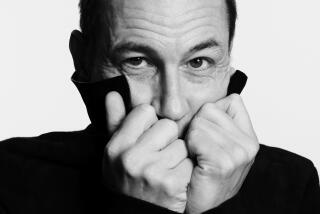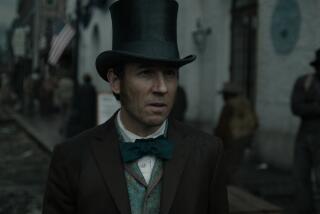In ‘Hitchcock’ and ‘Lincoln,’ two icons, divergently portrayed
One man liberated America from the scourge of slavery. The other freed the country of its preconceptions about cinema and entertainment.
OK, so there’s no comparing the moral achievements of Abraham Lincoln and Alfred Hitchcock. But both men followed their heart, advanced a vision and, in their own ways, changed the course of the country.
Both men, of course, are now looming large on our movie screens. Steven Spielberg’s “Lincoln” opened in Los Angeles to a strong fan and critical reception two weeks ago, while Sacha Gervasi’s “Hitchcock” debuted this past weekend to decent if not overwhelming box office. It’s hard to remember a season when two icons of this scale were on screen at the same time. It’s even harder to imagine two performances more different from one another.
As Lincoln, Daniel Day-Lewis goes big by going small, choosing to give the president depth rather than heft. He rarely raises his voice, favors self-knowing humor and generally eliminates rivals not by cutting them down but by maneuvering around them. There are few grand pronouncements or emotional gestures that stay with you after you leave the theater; instead, it’s the cumulative effect of a man guided by a moral code and a skillful opportunism you’re most likely to remember.
As Hitchcock, Anthony Hopkins takes a very different tack. Tasked with personifying a man who lived his life in Technicolor, the actor goes big by, well, going bigger. He portrays the British-born, Los Angeles-dwelling director trying to get “Psycho” made with a flamboyant, almost hammy panache. “Who should I make the check out to,” Hopkins’ lip-smacks to a movie-studio executive he’s just bested, his voice drenched in triumphalism.
Some of these differences, of course, are the result of the subjects themselves. The 16th president was, per Tony Kushner’s script, a man who internalized his stresses and abided his contradictions. On the other hand, there was little internalized about Hitchcock, who made sure everyone around him knew what he was feeling at any given moment (whether or not they wanted to possess such knowledge).
And though Lincoln and Hitchcock both carefully groomed their legacies, for the president, personality and ego were tools to get him there. For the director, they were often ends unto themselves.
But the contrast in these two portrayals is more than biographical -- it says something fundamental about acting styles.
Day-Lewis, after all, is a performer who often prefers restraint. Even when his character goes broader, it’s the little moments that define him -- the fitful wins in “My Left Foot,” the brooding remorse of “The Ballad of Jack and Rose.” Quick, name the most memorable piece of dialogue Day-Lewis has ever uttered. It’s probably “I drink your milkshake” from “There Will Be Blood,” a moment that is bold and brassy, to be sure, but notable for its meme status as much as for Lewis’ acting. And even then, it’s a departure from the taciturn manner he has shown throughout the film.
Hopkins has often been Day-Lewis’ mirror image. He has a flair for the showy moment or colorful gesture. His most notable line, “Hello, Clarice,” has a gleeful cartoonishness to it. You wouldn’t want Daniel-Day Lewis trying it. He probably wouldn’t want to either.
The conventional wisdom this time of year is that actors who play known people have a leg up come Oscar time. After all, five of the last eight best actor winners were incarnating real-life people, such as Truman Capote or a future king of Britain
But that’s a bit of a simplification. Playing a “real person” isn’t a very meaningful descriptor when it comes to award-caliber performances. As this season shows, even -- and perhaps especially -- when it comes to an icon such as Lincoln or Hitchcock, there’s a lot more than one way to wield the knife.
ALSO:
Thanksgiving newcomers can’t beat final “Twilight”
For “Hitchcock” director, a different kind of suspense
Decent debuts for “Hitchcock,” “Rust and Bone” in limited release
PHOTOS AND MORE
VIDEO: What movies to see during the holidays
The Envelope: Awards Insider
PHOTOS: NC-17 movies: Ratings explained
More to Read
Only good movies
Get the Indie Focus newsletter, Mark Olsen's weekly guide to the world of cinema.
You may occasionally receive promotional content from the Los Angeles Times.











